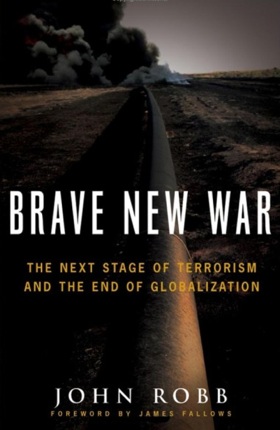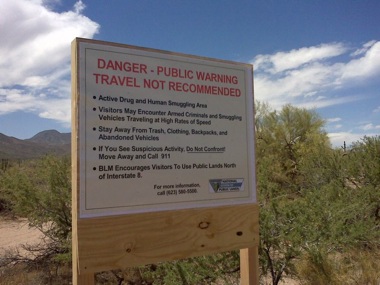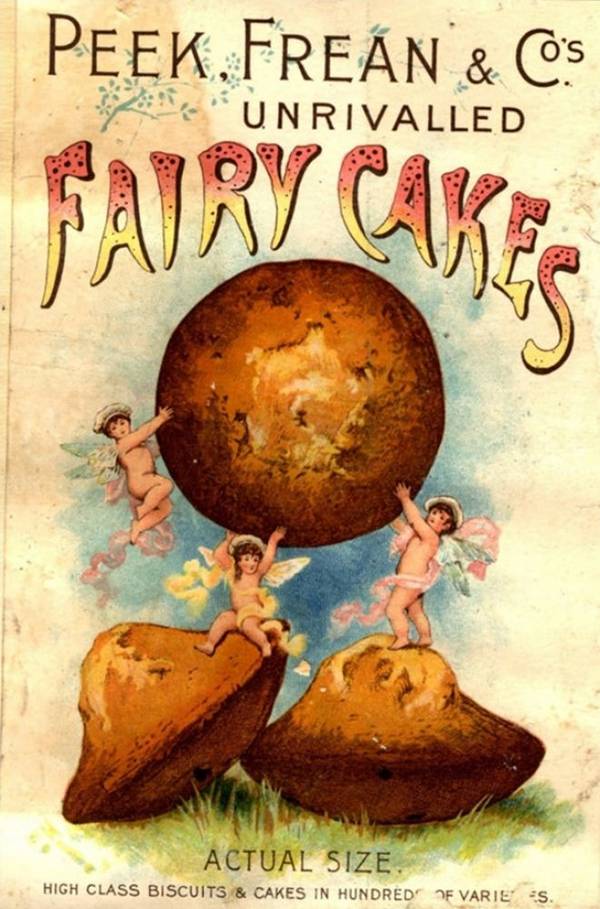The Latest from Boing Boing |  |
- Jon Stewart on Obama's broken civil liberties promises
- Miniature sitcom sets
- ORGCon: London, July 24 -- book now!
- Sweet Tooth: gripping, post-apocalyptic graphic novel off to a killer start
- 1890 ad for "unrivalled" fairy cakes
- HOWTO silence vuvuzela drone on your TV
- Shortest-possible Monopoly game
- Yugoslavian illustrated children's encyclopedia, 1960
- Book-tours with Android
- Gregor MacDonald - Energy, transportation, and transitions
- Painting: Kim Jong Il Launches Nuclear War
- Supercute! video "Not To Write About Boys"
- Charles Schulz' comic strip for churchgoing teens
- Gorgeous luxury loudspeakers
- BP Gulf Disaster: official leak estimate revised upward to 35,000-60,000 barrels per day
- Oil spill: Here's what you can do to help
- Lightning strikes massive Jesus statue
- BP vs. Aquaman
- Chris Reccardi's space colony print
- John Robb interview: Open Source Warfare & Resilience
- The Mexican Narco-Insurgency
- Remember the sinkhole? Guatemala still reeling from Agatha, here's how to help
- David Byrne: The Venue Makes the Music / Creation in Reverse (TED video)
- Al Gore: Stop the censorship in the Gulf
- Jesus in a tortilla, meet Satan in an oil spill
- Devo exploits cats to promote new record
- Dangerous Minds interview with Mark
- Rent-a-white-guy for your Chinese business meeting
- Tweet your favorite item in Makers Market / Boing Boing Bazaar to win it
- Afghanistan: Is miraculous $1T mineral discovery just war PR ops?
| Jon Stewart on Obama's broken civil liberties promises Posted: 16 Jun 2010 04:24 AM PDT Here's Jon Stewart doing eight minutes on the promises that Barack Obama has broken on civil liberties since he took office -- from arresting whistleblowers to maintaining the suspense of habeas corpus to continuing warrantless wiretaps to sustaining extraordinary rendition to authorizing the execution of American citizens without trial outside of combat zones. Like I said before: I didn't expect the guy to walk on water, but I'd love it if he wouldn't wallow in shit. Jon Stewart on Obama's executive power record
|
| Posted: 16 Jun 2010 04:09 AM PDT  Charles Brogdon's "Hand-Made Hollywood" project involves creating incredibly detailed miniature replicas of the sets for vintage sitcoms and soaps (Cheers, Murphy Brown, Family Ties, Seinfeld, The Young and the Restless, etc), including all the set-lights and other pieces, as though standing ready for a claymation meta-TV-show about the shows' production and actors. Shown here: the Brady Bunch kitchen. Hand-Made Hollywood (Thanks, Charles!) |
| ORGCon: London, July 24 -- book now! Posted: 16 Jun 2010 03:07 AM PDT Michael from the UK Open Rights Group sez, ORGCon: July 24 (Thanks, Michael!) |
| Sweet Tooth: gripping, post-apocalyptic graphic novel off to a killer start Posted: 16 Jun 2010 02:12 AM PDT  Jeff Lemire's Sweet Tooth Vol. 1: Out of the Woods is a great post-apocalyptic graphic novel in the tradition of The Walking Dead and Y: The Last Man, featuring likable innocents walking a blasted, ruined America, helped and hindered by good people gone bad, and bad people gone worse. Jeff Lemire's Sweet Tooth Vol. 1: Out of the Woods is a great post-apocalyptic graphic novel in the tradition of The Walking Dead and Y: The Last Man, featuring likable innocents walking a blasted, ruined America, helped and hindered by good people gone bad, and bad people gone worse. In Sweet Tooth, we meet Gus, a 9-year-old boy living in a shack in the woods with his dying, deeply (and crazily) religious father. Gus isn't like other boys: he lives in the woods and has never seen a living soul apart from his father (and his mother, who died when he was an infant). Oh, and Gus has antlers. Some sort of plague has destroyed the world; a plague that made some children born part animal, a plague that is killing Gus's father. All Gus's father wants from his boy is for him to stay hidden once he is alone, to stay in the woods and avoid the fires of hell that burn outside their woods. But when his father finally dies, Gus is hunted by evil men from beyond, and then rescued by a strange, dour fellow who promises to take him to The Reservation, where other children like Gus are kept. So begins the road trip, spattered with violence and slow revelations about the hell that has been visited on the earth. This first volume only gets the story started, gets us to a place of extreme and intense suspense, and then cuts off. If you can't wait to find out what happened next, you can try your local comic-shop for the singles that follow, but I'm going to wait for next December, and volume 2 of the bound graphic novels. Sweet Tooth Vol. 1: Out of the Woods
|
| 1890 ad for "unrivalled" fairy cakes Posted: 15 Jun 2010 10:07 PM PDT |
| HOWTO silence vuvuzela drone on your TV Posted: 15 Jun 2010 10:05 PM PDT If watching the World Cup has you feeling like you live in a building filled with enraged, sleepless bees, you can try filtering out the vuvuzelas' distinctive dentist-drill whine, using a computer or a TV with a good equalizer: How to Silence Vuvuzela Horns in World Cup Broadcasts (via /.) |
| Shortest-possible Monopoly game Posted: 15 Jun 2010 10:02 PM PDT Here's the Scatterplot blog's recipe for playing a complete game of Monopoly in 21 seconds. Which is about as long as anyone should have to endure a game of Monopoly. (What a dumb game: as someone pointed out at The Story event, it takes forever to play, there's virtually no skill involved, and you can tell who's going to win a long, long time before it's finally over). We went away to a rented country house last weekend for a friend's birthday and there was, of course, a Monopoly set. Which got me thinking: there are Monopoly sets everywhere: someone should figure out a Cheapass Games-style set of alternate rules for a really fun game that treats all that monoponalia as free infrastructure: a given that every household will have a box full of fake money, miniature houses and hotels, and so on. The Shortest Possible Game of Monopoly: 21 Seconds (via Kottke) |
| Yugoslavian illustrated children's encyclopedia, 1960 Posted: 15 Jun 2010 09:56 PM PDT  Svijet oko Nas is a Soviet-era children's encyclopedia published in Yugoslavia in 1960. The artwork is fantastic, and Flickr user Sandra Eterovic is scanning some of the best examples. A book: Svijet oko Nas (Thanks, Zoran!)
|
| Posted: 15 Jun 2010 09:52 PM PDT My latest Guardian column, "The mobile revolution has arrived," describes the way that touring with a rooted NexusOne phone fundamentally changed the experience of being on a book-tour, delivering a touring author's two most precious commodities: better food and more sleep. Travelling with your own internet source is brilliant. At Atlanta airport, I was stuck for four hours while a monster storm hammered the building with barrages of lightning. Immediately, every one of the expensive Wi-Fi networks in the building went dead as thousands of stranded travellers tried to use them all at once. I found a corner with a mains outlet, plugged in the laptop, tethered my phone, and enjoyed my own private network connection. It wasn't fast, but it was free and it worked.The mobile revolution has arrived
|
| Gregor MacDonald - Energy, transportation, and transitions Posted: 15 Jun 2010 09:23 PM PDT  Gregor MacDonald is an independent energy analyst & investment consultant. He publishes public analysis to his website, Gregor.us and hosts the internet investment show, StockTwits.tv, with Howard Lindzon. He offers private consultancy and regular email newsletters on global energy trends & investment guidelines. I asked him some questions about his background, the state of global energy, the BP disaster, and California's dependency on oil... How did you end up as an energy investment analyst? Would you describe the work you do now? In 1995 I moved to London and found that living outside my own country enabled me to see the world with fresh eyes. In university I had studied cultural anthropology with an emphasis on markets and economies, and a number of the insights from those studies began to unfold the more time I spent in the UK, and Europe. I started to become interested in currencies as a cultural phenomenon, for example. I concluded there was very little logic in the purchasing power of the US Dollar, The British Pound, and continental currencies, and I started to form an early idea that perhaps in relation to oil, the US Dollar was overvalued. And that's how my interest in oil began. For it
|
| Painting: Kim Jong Il Launches Nuclear War Posted: 15 Jun 2010 09:28 PM PDT |
| Supercute! video "Not To Write About Boys" Posted: 15 Jun 2010 08:10 PM PDT I have a Facebook account but I hardly ever check it. I just took a peek at the hundreds of messages waiting for me, and saw that one of them was from Spike Priggen of Bedazzled!, who wrote in April, So you posting that Supercute video got them on a big tour opening for Kate Nash!Yippee! Here's a recent video by "New York City's teen-indie-bubblegum-pop sensation." |
| Charles Schulz' comic strip for churchgoing teens Posted: 15 Jun 2010 05:35 PM PDT  This is what good ol' Charlie Brown and the other peanuts will look like when they finally hit puberty. It's freaking me out. |
| Posted: 15 Jun 2010 02:50 PM PDT  I have no idea how these speakers sound, but they are quite beautiful. And also quite expensive. They are the Davone Ray loudspeakers, available in a lovely walnut finish. $6000/pair. Davone Ray loudspeakers (Thanks, David "Mog" Hyman!) |
| BP Gulf Disaster: official leak estimate revised upward to 35,000-60,000 barrels per day Posted: 15 Jun 2010 02:22 PM PDT |
| Oil spill: Here's what you can do to help Posted: 15 Jun 2010 02:17 PM PDT  Drive less. Yeah, OK, that's pretty simplistic. But the point is: You and I are not helpless bystanders in this mess. Offshore drilling—especially deepwater offshore drilling—is not a simple project that BP and other oil companies get involved in for the giggles. They do it because there is a demand for the oil. If we were to completely and permanently halt offshore drilling in this country, it wouldn't fix the problem. In 2009, 1.7 million barrels of oil were produced, every day, from offshore wells in United States. That's a drop in the bucket compared to our 19.5 million barrel a day consumption, or even the almost 9 million barrels of gasoline we burn through every day. But that doesn't mean offshore oil is inconsequential. If we don't get it here, we'll still get it from somewhere. And that has consequences, both for our pocketbooks and the environment. (Canada is the biggest exporter of oil to the United States. Eliminating offshore wells and increasing our use of tar sands is not exactly a healthy trade off.) Plus, as Jeff Vail of the Oil Drum blog told me, this model—complicated, risky drilling for a relatively small amount of oil—is the future. We simply aren't finding a lot more of those big, easily accessed wells that fueled the past century. These are the facts. And there's basically two ways of looking at them. One perspective assumes that U.S. oil consumption will only increase, that we must have this resource. Thus, we must have offshore wells. And lots of them. The other perspective: It's time to actually get serious about reducing our oil demand. With a 9% reduction in national daily gasoline consumption, we could eliminate our need for offshore oil. At 22.4 miles per gallon, that's just 4.2 fewer miles of driving, per person, per day. Bill Finch at The Nature Conservancy did this calculation back in May, but his numbers are a bit off from what I'm seeing on the Energy Information Administration site, so I'm going to do this again, real quick. I've made it easy to skip if your eyes glaze over. Here is where we start talking about statistics and numbers 1.7 million barrels: Amount of oil produced by all offshore drilling in U.S. waters, per day. About 20 gallons of motor gasoline can be made from each 42-gallon barrel of oil So offshore drilling represents about 34 million gallons of gasoline per day. Total U.S. daily consumption of gasoline: 378 million gallons per day. This number only includes the kind of gasoline that runs the average car. Aviation and jet fuel, diesel fuel for commercial trucking, that's all extra. We aren't dealing with that here. To eliminate the need for the amount of gasoline represented by offshore oil, we have to reduce daily gasoline consumption by about 9%. US daily vehicle travel averages out to about 40 miles per person, per day. The average driver actually does a bit better than that: 29 miles per day. But, because we're talking about national rates of consumption, we're going to stick to that scale and talk about national mileage. 22.4: Miles per gallon the average car gets in the United States. At 40 miles of travel, an American with an average car would use about 1.8 gallons of gasoline per day. A 9% reduction means taking that down to about 1.6 gallons, or 35.8 miles of travel. 4.2 miles per day less. There's a possibility that I'm missing something here, either in the logic or the math, that one of you will point out to me. But as I figure it, them's the facts. Here is where we stop talking about statistics and numbers Obviously, this is a little difficult to apply on an individual level, as we all drive different amounts and have vehicles with a wide variety of gas mileages. But we can all reduce the amount of gasoline we consume by 9%. And there's a wide variety of ways to can get there: Combine trips, drive a vehicle with better gas mileage, take public transportation, carpool with friends and neighbors, walk or bike instead, find shorter routes, or even just skip a trip. You just use your odometer to figure out your average daily mileage each week, and to figure how many miles per gallon your car is really getting. Then mix and match the solutions to reduce your daily gasoline consumption by 9%. I'm not going to pretend that this is simple. It takes some restructuring of the way we live, and it takes planning where you didn't have to plan before. But, if we really don't want another Deepwater Horizon spill, this is part of the solution. We can't complain about BP's greed, the government's lack of oversight and everybody's post-spill floundering and not acknowledge the part of the blame that lies on our shoulders. We wanted that oil. We wanted that oil cheap. In giving us what we wanted, BP and the government made some horrible decisions that we wish they wouldn't have made. They picked up a gun, loaded it and shot into the dark. But we're the ones who told them that the night was full of zombies. Can we really say we're not responsible when they accidentally kill a healthy toddler? So, cutting our daily gasoline consumption by 9%. Some of it will be fun—biking, chatting with friends in a carpool, coming up with new activities to do within walking distance, instead of driving for our entertainment. Other times, it will be a pain in the ass. But, that's our responsibility. That's what we owe for our role in this mess. Image courtesy Flickr user midorisyu, via cc
|
| Lightning strikes massive Jesus statue Posted: 15 Jun 2010 02:15 PM PDT    Last night, lightning struck a six-story tall Jesus Christ statue north of my hometown of Cincinnati, Ohio, sparking a fire that burned the figure down to its steel frame. The end is nigh. From the Associated Press: The sculpture, 62 feet tall and 40 feet wide at the base, showed Jesus from the torso up and was nicknamed Touchdown Jesus because of the way his arms were raised, as though reaching out to catch a football. It was made of plastic foam and fiberglass over a steel frame, which is all that remained early Tuesday."Gigantic 62-foot Jesus statue struck by lightning, destroyed" (Thanks, everyone!) |
| Posted: 15 Jun 2010 01:53 PM PDT |
| Chris Reccardi's space colony print Posted: 15 Jun 2010 01:45 PM PDT  Los Angeles illustrator/animator Chris Reccardi, who worked on classics like The Ren & Stimpy Show, The Powerpuff Girls, and Samurai Jack, was one of the first artists to set up shop in the Boing Boing Bazaar. I was delighted that his limited-edition psi-fi prints sold like gangbusters! Now, Chris has issued a mindbendingly cool new print at a very low price compared to many of his other more-limited fine art editions. "2464 Dream" is a signed and numbered 13" x 19" print, limited to 250, and sells for $65! "2464 Dream" |
| John Robb interview: Open Source Warfare & Resilience Posted: 15 Jun 2010 02:20 PM PDT  John Robb is a globally-recognized author, technologist, and entrepreneur specializing in the complex systems of insurgency and asymmetrical warfare. His book, Brave New War, is an Amazon best-seller and established his expertise as a researcher & military consultant. He has been featured in the New York Times, The Economist, and the Wall Street Journal. His daily thoughts are collected on his blog, Global Guerrillas. John Robb is a globally-recognized author, technologist, and entrepreneur specializing in the complex systems of insurgency and asymmetrical warfare. His book, Brave New War, is an Amazon best-seller and established his expertise as a researcher & military consultant. He has been featured in the New York Times, The Economist, and the Wall Street Journal. His daily thoughts are collected on his blog, Global Guerrillas. I asked him some questions about his work, our times, and the shifting landscape of governance & power... In your book Brave New War you explore the changing nature of warfare. What are some recent examples of insurgency, resource conflicts, or terrorism that you feel best illustrate this new landscape? Here's an interesting story that may do the trick. Back in 2004, the US military was getting trounced in guerrillas in Iraq. Worse, the US military establishment didn't know why. Didn't have a clue. To correct this, I began to write about how 21st Century warfare actually worked on my blog, Global Guerrillas. Essentially, I concluded that guerrilla groups could use open source organizational models (drawn from the software industry), networked super-empowerment (freely available high tech tools, network information access, connections to a globalized economy), and systems disruption (the targeting of critical points on infrastructure networks that cause cascading failures) to defeat even the most powerful of opponents, even a global superpower. The new theories of warfare I developed on the blog proved both predictive and very popular. As a result, I spent a lot of time on the speaking circuit in Washington DC (DoD, CIA, NSA, etc.). Of course, since my work was on a blog everyone could read it, even the guerrillas themselves. So, it was a little surprising although not
The United States is suffering both the economic decline of
|
| Posted: 15 Jun 2010 01:50 PM PDT  Benefiting from the inflated margins of the illegal drug trade, Mexican cartels move billions of dollars worth of cocaine, methamphetamine, & marijuana to the high-demand markets of the United States, using sophisticated weaponry and horrific violence to defend their markets against competitors and directly challenge attempts by state militia to control their activities. In return, they purchase guns from border states like Texas, Arizona, and California to arm their narco-insurgency. The Mexican state apparatus has become a hollow shell, heavily militarized but incapable of managing its territories. Benefiting from the inflated margins of the illegal drug trade, Mexican cartels move billions of dollars worth of cocaine, methamphetamine, & marijuana to the high-demand markets of the United States, using sophisticated weaponry and horrific violence to defend their markets against competitors and directly challenge attempts by state militia to control their activities. In return, they purchase guns from border states like Texas, Arizona, and California to arm their narco-insurgency. The Mexican state apparatus has become a hollow shell, heavily militarized but incapable of managing its territories. PEMEX, the major oil developer along the Mexican Gulf, has reported that cartels siphon about $1B in oil annually, reselling it on the open market to fund their insurgency. This tactic has escalated to include the
|
| Remember the sinkhole? Guatemala still reeling from Agatha, here's how to help Posted: 15 Jun 2010 01:34 PM PDT  The photograph above went viral a few weeks ago, when massive storms and volcanic eruptions caused displacement, injury, and death throughout Guatemala. The sinkhole snapshot is long gone from the top of trending Google link lists, but people are still suffering throughout the country—the worst off, as usual, are marginalized indigenous communities who make up the poorest sector of the population. As dramatic as this photo was, the sinkhole is the least of Guatemala's worries. How you can help... (PHOTO: Mercado Global, via AIDG - Searching for survivors in a mudslide)
Renata Avila (disclaimer: a colleague of mine in a not-for-profit org that serves this region) writes, The Rigoberta Menchu Foundation has a digital center based on one of the most affected areas, San Lucas Toliman, so it is a good channel to help people. General Info in English here. Also, I've created this repository of aid links and disaster info, mostly in Spanish, and I will try to keep it updated. Catherine Lainé of AIDG points us to this emergency appeal update from AIDG, who do good work in the area:
AIDG sent a team down last week to work with the Lake Atitlan based organization Mercado Global to assess damage and coordinate repairs on water systems for communities. Water is a critical need as pipes have been washed away and local water systems have been damaged. Read more here. Link includes a donation button.
|
| David Byrne: The Venue Makes the Music / Creation in Reverse (TED video) Posted: 15 Jun 2010 12:56 PM PDT TED has published video of a presentation by David Byrne at this year's edition of the event. Byrne explains, Watch the video on the TED website, or you can download it as a video podcast from iTunes. (photo: Clayton James Cubitt) |
| Al Gore: Stop the censorship in the Gulf Posted: 15 Jun 2010 12:41 PM PDT Al Gore on reports that journalists and news photographers have been banned and bullied away from the scenes of devastation in the gulf, and from interviewing sources who might provide information unflattering to BP: This behavior is completely unacceptable. Access by reporters should be as unfettered as possible. This de facto form of censorship needs to stop(via Instapundit) |
| Jesus in a tortilla, meet Satan in an oil spill Posted: 15 Jun 2010 12:39 PM PDT  Douglas Hand asking the questions others are afraid to ask, on the website for the stupendously fantastic radio program Coast to Coast AM.
Watching a live video of the leak I see streams of faces blowing upwards—screaming souls escaping from hell (...) this image is undeniable. Note the teeth, horns and claw hand, and could that spot on the coast be the 'splash' from a tossed object?Undeniable.
|
| Devo exploits cats to promote new record Posted: 15 Jun 2010 12:46 PM PDT  This CAT LISTENING PARTY on Ustream.tv for Devo's new release Something for Everybody is the best thing ever. Ongoing through 8pm PT today. The cats seem happy with the record, but there's an awful lot of toy mousie carnage. (Ustream, via Marc Brown) This CAT LISTENING PARTY on Ustream.tv for Devo's new release Something for Everybody is the best thing ever. Ongoing through 8pm PT today. The cats seem happy with the record, but there's an awful lot of toy mousie carnage. (Ustream, via Marc Brown) |
| Dangerous Minds interview with Mark Posted: 15 Jun 2010 11:15 AM PDT My old friend Richard Metzger interviewed me about Made By Hand for his Dangerous Minds program. Made by Hand: Searching for Meaning in a Throwaway World is Mark Frauenfelder, editor of Make and co-founder of Boing Boing's ode to the DIY lifestyle and slowing life down enough to allow for purposeful—and life enhancing—activities. Mark discusses bee keeping, raising chickens and the four and a half months he and his family spent living on a tiny island in the South Pacific. He also talks about his recent appearance on The Colbert Report and about the burgeoning DIY Maker scene across America.If you haven't seen any of Richard's other interviews, I highly recommend them. In particular, check out the interviews with Charles Johnson of Little Green Footballs, Genesis P-Orridge of Throbbing Gristle, Kim Fowley of The Runaways, and Paul Krassner of The Realist. |
| Rent-a-white-guy for your Chinese business meeting Posted: 15 Jun 2010 10:43 AM PDT Chinese entrepreneurs are renting random white guys to pretend to be visiting businessmen, and to lend an aura of general Being Connected to the West to business meetings, conferences and receptions: And so I became a fake businessman in China, an often lucrative gig for underworked expatriates here. One friend, an American who works in film, was paid to represent a Canadian company and give a speech espousing a low-carbon future. Another was flown to Shanghai to act as a seasonal-gifts buyer. Recruiting fake businessmen is one way to create the image--particularly, the image of connection--that Chinese companies crave. My Chinese-language tutor, at first aghast about how much we were getting paid, put it this way: "Having foreigners in nice suits gives the company face..."Rent a White Guy (via Kottke) |
| Tweet your favorite item in Makers Market / Boing Boing Bazaar to win it Posted: 15 Jun 2010 10:30 AM PDT  Make and Boing Boing are holding a contest to win your favorite item in the Makers Market / Boing Boing Bazaar. Here's how to enter: 1. Look around Makers Market / Boing Boing Bazaar and pick out your favorite product of value $500 US or less. You can pick a more expensive product, in which case, if you win, the first $500 is on us. 2. If you're not already following the Makers Market Twitter feed, do so by visiting this link or by tweeting "follow @themakersmarket". Contest winners will be notified using Twitter's "direct message" feature, and if you're not following us, we can't message you, and you can't win. 3. Tweet the URL of your favorite product, and the URL of the contest landing page (http://bit.ly/9p97ad), and make sure you include "@themakersmarket" so we receive your tweet. We recommend cutting and pasting the following text into your twitter window... Tweet your favorite item @themakersmarket to win it! http://bit.ly/9p97ad Mine is:...followed by the URL of your favorite product. You will probably need to use a URL shortener to make it all fit into a tweet's 140 characters. We find bit.ly works well. Eleven winners will be selected randomly from among tweets received before 11:59 p.m. PDT on July 15, 2010. One first-place winner will receive their tweeted choice of products from among those for sale on Makers Market having value of $500 US or less. If your favorite product costs more than $500, the first $500 is on us. Ten runners-up will receive $25 toward their choice of products from among those for sale on Makers Market. Good luck and happy tweeting! Please see the contest landing page for more details, and official rules. |
| Afghanistan: Is miraculous $1T mineral discovery just war PR ops? Posted: 15 Jun 2010 07:46 PM PDT  American news media was all aflutter yesterday over a story by James Risen in the New York Times about an Immaculate Detection of massive mineral wealth in US-occupied Afghanistan. Finally, some positive news from America's longest-running war in history! Afghanistan is suddenly poised to become "the Saudi Arabia of lithium." Let's occupy the place forever, and say farewell to our dependence on foreign lithium for iPhones and Blackberrys! A handful of essential follow-up reads: Armbinder in The Atlantic, a Christian Science Monitor post by Ben Arnoldy, Blake Hounshell in Foreign Policy, and this Wired Danger Room item by Katie Drummond, all of which point to documents on the "Afghan motherlode" dating back to 2007 and earlier. [T]he military (and observers of the military) have known about Afghanistan’s mineral riches for years. The U.S. Geological Survey and the Navy concluded in a 2007 report that "Afghanistan has significant amounts of undiscovered nonfuel mineral resources," including "large quantities of accessible iron and copper [and] abundant deposits of colored stones and gemstones, including emerald, ruby [and] sapphire."No, the U.S. Didn't Just 'Discover' a $1T Afghan Motherlode (Wired News) Oh, and the graphic above this piece is a US Geological Survey Geologic and Mineral Resource Map of Afghanistan from... 2006. Here's a PDF. Update: James Risen was upset by critical reaction to the New York Times piece. In an interview with a Yahoo News blogger (heh), he said he thinks bloggers sit around "jerking off into their pajamas." The quote was edited to be more family-friendly. Risen later apologized for the outburst, saying he was taken aback by all the internet criticism. The Yahoo item is a good read, Risen is no slouch, and sometimes nuance is lost online. But as a blogger, I choose to remain personally and irreparably offended by the remark 'til the end of all time (or 'til we get out of Afghanistan, whatever comes first). |
| You are subscribed to email updates from Boing Boing To stop receiving these emails, you may unsubscribe now. | Email delivery powered by Google |
| Google Inc., 20 West Kinzie, Chicago IL USA 60610 | |







 My talk (it wasn't a musical performance) was based on the idea that the acoustic properties of the clubs, theaters and concert halls where our music might get performed determines to a large extent the kind of music we write. We semi unconsciously create music that will be appropriate to the places in which it will most likely be heard. Put that way it sounds obvious...but most people are surprised that creativity might be steered and molded by such mundane forces. I go further -- it seems humans aren't the only ones who do this, who adapt our music to sonic circumstances -- birds do it too. I play lots of sound snippets as examples, with images of the venues accompanying them...enjoy.
My talk (it wasn't a musical performance) was based on the idea that the acoustic properties of the clubs, theaters and concert halls where our music might get performed determines to a large extent the kind of music we write. We semi unconsciously create music that will be appropriate to the places in which it will most likely be heard. Put that way it sounds obvious...but most people are surprised that creativity might be steered and molded by such mundane forces. I go further -- it seems humans aren't the only ones who do this, who adapt our music to sonic circumstances -- birds do it too. I play lots of sound snippets as examples, with images of the venues accompanying them...enjoy.
No comments:
Post a Comment